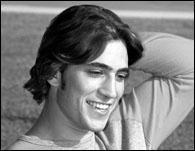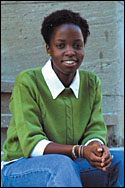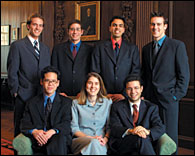Newsbites (Page 3)
Calendar in a Good Cause
 |
|
|
|
|
McGill Psychology student Kristen Bussandri has cooked up a dynamite recipe for fundraising success. Take 12 handsome men from one of the most elegant and diverse cities in North America. Add a photographer, a makeup artist, a large helping of altruism and a financial donation to offset production costs. The result is the tasteful, yet tasty Men of Montreal calendar which went on sale in early December to benefit the McGill Cancer Centre. The Centre's Director, Dr. Michel Tremblay, applauds Bissandri's efforts, saying, "This kind of fundraising effort makes a huge difference to the Centre. With the proceeds from these calendars, we are able to apply to the Canada Foundation for Innovation for a grant that gives us four dollars for every dollar donated."
Bussandri first got the idea of making the calendar a year ago. "I saw a similar calendar from another university and all my girlfriends were ooh-ing and aah-ing over the guys, so I though it'd make a great fundraising idea for McGill." Her primary motivation for embarking on the project that she frankly admits was a "nightmare of coordination" was her firm belief in the importance of giving back. Bussandri had little trouble finding 12 men from varied backgrounds to volunteer their time and faces for such a good cause.
"I told friends who told their boyfriends, and I spoke to people I spotted on campus." Did anyone have an extreme reaction to being asked? "Not really," she says, "although some people were kind of shocked when I approached them."
Bussandri solicited a donation of $500 for the purchase of film from Pegabo, the shoe store chain, and obtained the vital volunteer services of a makeup artist and photographer.
Seven of the calendar men are McGill students: Chris Eich (Economics), Jordan Nemis (Science), Tyler Chernin (Microbiology and Immunology), Peter Tomkinson (Kinesiology), who is pictured here, Jacob Grzywacz (Engineering), Elliot Pastor (Political Science) and Jamie Govan (Management).
Bussandri, who will graduate in April 2003, says she learned an enormous amount about "every aspect of fundraising. I had to take care of recruiting, public relations and finance," she reports with pride. In the five months that it took to coordinate and produce the calendar, she also learned how to deal with the printing and sales end of the project. It seems the learning paid off. By the week before Christmas, the 500 calendars in print had sold out. For those who would still like to buy a calendar, more will be available in January for $12 apiece from the McGill Bookstore or from Susan Grossman at the McGill Cancer Centre (susan.grossman@mcgill.ca).
Prime Ministerial Visit
|
|
 PHOTO: Owen Egan PHOTO: Owen Egan
|
|
|
|
Prime Minister Jean Chrétien paid a visit to McGill in September to officially inaugurate the Brain Tumour Research Centre at the Montreal Neurological Institute (MNI). The three-storey addition to the MNI houses state-of-the-art facilities for brain tumour research as well as the de Grandpré Communications Centre, a world-class telecommunications facility equipped for telemedicine, multimedia presentations, video-conferencing and distance learning.
"What we are celebrating today is leadership," said the Prime Minister at the opening ceremony. "The leadership of the people who have made these facilities possible. The leadership of the world-renowned scientists here today -- a prime example of Canada's commitment to excellence in medical research and innovative treatments. Scientists here will teach and train a new generation who will serve not only Canada, but the entire global community." The Centre was made possible by private donations and government funding.
The Brain Tumour Research Centre is part of a national effort to make Canada a world leader in the fight to beat tumours of the nervous system.
"We are engaging a wide network of researchers that includes participants from the MNI, McGill, across the nation and around the world. The goal is to take advantage of recent discoveries in cancer biology pioneered at several international institutions and apply them to this very important problem," said Dr. David Colman, Director of the MNI.
Luck of the Draw
 PHOTO: Owen Egan PHOTO: Owen Egan
|
|
|
|
|
Chance played a starring role in the arrival of Betty Angwenyi at McGill. A teacher at her high school in Nairobi, Kenya, handed her a copy of the American Colleges and Universities magazine which led her to the ACU web site. Here, while filling out applications to universities in various parts of the world, a pop-up window appeared inviting her to enter the ACU sweepstakes -- the prize was a US$10,000 scholarship for one lucky applicant.
The sweepstakes was applicable to any university affiliated with the ACU, with the funds being applied to the student's tuition once he or she had been accepted. Angwenyu selected five universities from the U.S. and had just finished the applications when a friend advised her to apply to McGill. "I almost couldn't stand the idea of filling out another form," she laughs, "but I did it anyway." In fact, after carefully reviewing the prospectus, she decided that McGill's Faculty of Management offered just what she wanted.
Then in April, she learned that she was the 2002 ACU lottery winner.
Angwenyi says that the serendipitous win was the beginning of "everything falling into place." Now halfway through her first term in the BCom program, she confirms that the program is a perfect fit and is enthusiastic about choosing McGill. "It's a superb school with a reputation that stretches far and wide."
And though she's a long way from home and family, Angwenyi says there are compensations to be found both on and off campus. "The city rocks," she says. "There's so much variety -- I've never ever felt like a stranger. You talk to people here on campus and they're from all over the world -- you get to know things spontaneously. You gain a lot, a lot more than you lose."
Supreme Students
|
|
 Back row:
Webber, Rabinovitch, Shandal, Wiener. Front row: Kong, Stephens,
Luftglass Back row:
Webber, Rabinovitch, Shandal, Wiener. Front row: Kong, Stephens,
LuftglassPHOTO: Owen Egan |
|
|
|
Seven McGill law students have nabbed the country's most prestigious articling positions. They're also quite probably the toughest articling positions. After all, the aspiring lawyers' bosses will be the most powerful legal figures in the land -- the judges of the Supreme Court of Canada.
Hoi Kong, BA'95, MA'98, BCL/LLB'02, Menachem Luftglass, BCL/LLB'03, Ryan Rabinovitch, BCL/LLB'02, Vinay Shandal, BCL'03, Megan Stephens, BA'94, BCL/LLB'02, Grégoire Webber, BCL/LLB' 03, and Brandon Wiener, BSc'99, BCL./LLB'02, were all recently selected as Supreme Court clerks. McGill earned more clerking positions from Canada's top court than any other law school in 2002. McGill students tend to be popular picks for the clerking positions, says law professor Daniel Jutras. The University's law students receive training in both of the country's legal traditions and they take their courses in both English and French.
The Faculty of Law also encourages students to learn about legal systems in other countries and to get practical experience while they're still in school -- doing everything from offering free legal information to fellow McGill students to working on human rights internships in developing countries around the world.
"That kind of background is quite ideal for what they're expected to do around here," says Jutras, a former Supreme Court clerk himself. Jutras has begun a leave of absence from McGill to serve as the Supreme Court's executive legal officer. He will be Chief Justice Beverly McLachlin's principal advisor and is responsible for media relations involving the court.
"I haven't spoken to anyone who has done this who hasn't said that it was the best experience of their life," says Weiner. Weiner is starting bar school and will report to the Supreme Court in January 2004 to work with Justice Michel Bastarache. "These are the greatest legal minds in the country doing work that shapes the future of Canadian law."
Clerks are selected for their top marks, but the justices, who make the final selections themselves, also look for superior writing skills, proven research abilities and proof that candidates have led interesting lives outside the classroom. The clerks have to be stellar -- their jobs are important. They help review the hundreds of appeals that are submitted to the Supreme Court every year and assist the justices in determining which will be heard.
The clerks might also find themselves queried by the justices about how McGill is faring these days, since three of them are grads: Ian Binnie, BA'60, LLD'01, Charles Gonthier, BCL'51, LLD'90, and the court's newest addition, Marie Deschamps, LLM'83.


